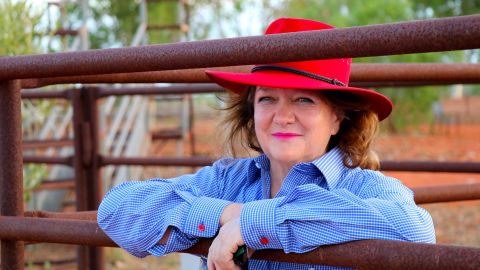Brisbane, Australia
CNN
—
When Australia’s richest woman, Gina Rinehart, threw a financial lifeline at Netball Australia, she sparked debate about sponsorship and the role of social and political issues in sport. Then she went away.
Rinehart’s bombastic decision to withdraw a A$14 million (US$8.9 million) sponsorship for Australia’s national netball team, the Diamonds, caught players off guard and dealt a blow to the future of Netball Australia – a debt-ridden sports federation.
The drama engulfing the Diamonds isn’t new, but experts say disputes could become more common as athletes and fans take a stronger stance on the source of the sponsorship money.
Last week, high profile Fremantle Dockers fans of the AFL called on management to sever ties with longtime sponsor, fossil fuel company Woodside, over its carbon emissions.
Meanwhile, Australian Test cricket captain Pat Cummins has reportedly raised issues with Cricket Australia’s deal with Alinta Energy for the same reasons.
For members of the Diamonds, the objections centered on racist remarks made by Rinehart’s father, Lang Hancock, the founder of her company Hancock Prospecting, nearly 40 years ago.
Rinehart is a keen supporter of Australian sports teams and is usually praised for her sponsorship deals. Last year, Olympic swimmer Cate Campbell reportedly said Rinehart “saved swimming.”
But Kevin Argus, a lecturer in marketing at RMIT University, said Rinehart’s decision on Saturday to withdraw funding from Netball Australia was a “missed opportunity” to “embrace the national sentiment”.
“In Australia we have seen many large, powerful corporations benefit enormously from positive links to sport and withdraw their financial support as soon as an issue with athletes arises,” he told CNN Sport.
“The Diamonds athletes raised concerns that they could be seen as supporters of a legacy of discrimination against Aboriginal people. Some have expressed concerns about the environment.
“These are important issues today that will not go away,” he said.
At the heart of the controversy is Noongar woman Donnell Wallam, a rising star who will make her debut this week as only the third Indigenous netball player to represent Australia.
Wallam had reportedly expressed reservations about wearing the Hancock logo due to comments Rinehart’s father had made about Australia’s First Nations.
During a television interview in 1984, Hancock said he would “high dose the water to keep them sterile and hatch themselves”.
His words are a dark reminder of racist attitudes toward Aboriginal peoples, and while Rinehart promotes her longstanding support of Aboriginal communities through royalties and charities, she has never publicly condemned her father’s remarks.
Wallam’s team-mates have gathered around them, and when the team rushed onto the pitch to play New Zealand in the Constellation Cup last week, they were wearing their old uniforms without the Hancock logo.
In Saturday’s statement, Rinehart and Hancock Prospecting said the Diamonds are not required to wear the logo during games in New Zealand and they have not refused to wear it.
The statement said Roy Hill, Hancock’s majority-owned mining company, would also support Netball WA, a state netball organization, as the two companies “do not want to contribute to Netball’s discord issues.”
Both Netball Australia and Netball WA would be offered four months of funding while they find new partners, the statement added.
Regardless, Rinehart and Hancock appeared to take a swipe at players by saying they felt it was “unnecessary for sports organizations to be used as a vehicle for social or political gain”.
“There are more purposeful and authentic ways to advance social or political causes without showing virtue or making oneself known,” the statement added.
On Monday, Australian Netball Players’ Association CEO Kathryn Harby-Williams told the Australian Broadcasting Corporation that Wallam had asked for an exception not to wear the logo and had been turned down.
“In the end, unfortunately, Donnell felt the print was too big and decided she would wear the logo.”
But it was too late.

Netball Australia has made no secret of its financial difficulties. Despite being Australia’s most popular team sport with 1.2 million players, it lost AU$4.4 million (US$2.8 million) last year.
Netball Australia CEO Kelly Ryan told Nine News the loss of the Hancock sponsorship was “disappointing” but there had to be a “strong balance” between social concerns and funding.
“There’s a really important role that sports organizations, from the grassroots to the elite, play in creating a safe environment for really strong social conversations,” Ryan said.
“But there also has to be a balance in terms of commercial realities.”
in an opinion, The players said they were “disappointed” by Hancock’s decision to withdraw the sponsorship and thanked fellow sponsors for their continued support.
The statement added: “Reports of a protest on behalf of the players over environmental concerns and a split within the gaming group are false. The only request from the players was to support our only indigenous team member.”
Vickie Saunders, founder of The Brand Builders, says Wallam’s objection to wearing the Hancock logo is deeply personal and not an issue of a gamer using their public profile to further a political cause.
“Your 60,000-year-old culture will tell you it matters. Your 200 years of survival and your fellow Indigenous people will tell you it matters,” Saunders said.
“She has a very personal reason for not wearing a logo that depicts a person who said their people should be sterilized or outbred,” she said. “This is not a new topic for you. This is her life.”

Hancock Prospecting was founded in 1955 and has interests in exploration for iron ore, coal and minerals, as well as beef and dairy.
The company also funds services for remote and rural Aboriginal communities, including health and education programs, and Rinehart is a familiar face in elite sporting circles.
The billionaire sponsors Swimming WA, Swimming Queensland, Volleyball Australia, Rowing Australia and Artistic Swimming Australia and recently inked a deal to sponsor the Australian Olympic team through 2026.
This week, in response to the Diamonds debate, many of those sports governing bodies released statements praising Rinehart’s dedication to the sport.
“Mrs Rinehart’s selfless dedication to women’s sport deserves recognition from our great sporting nation,” said Craig Carracher, President of Volleyball Australia. Swimming Queensland CEO Kevin Hasemann said he “finds regrettable the negative characterization of Ms Rinehart’s new sponsorship of another sport in some areas”.
The Australian newspaper also chimed in with an editorial saying there was no place for “abandon culture” – “Mrs. Sacrificing Rinehart because of her father Lang Hancock’s comments decades ago is a step too far.”
Netball Australia’s sponsorship deal would have been worth A$3.5 million (US$2.2 million) a year for four years – an almost negligible amount for a company that reported earnings of A$7.3 billion in 2021 ($4.6 billion) ore prices achieved on the back of rising iron.
Kim Toffoletti, associate professor of sociology at Melbourne’s Deakin University, said it can be difficult for less-established sports to turn down an offer of sponsorship.
“Your livelihoods are at stake … it’s very hard to turn down that kind of money because that’s what keeps your sport viable,” Toffoletti told CNN Sport.
“I don’t see it as a failure of the sport, but perhaps as a system where certain sports are rewarded economically and culturally over others, meaning many fall short.”
Today’s rising sports stars are members of Gen Z, born between the late 1990s and around 2010, and whose attitudes can differ from those of executives at established sports federations and big brands.
Experts say sponsors cannot expect young athletes to align with their values.
“Some of these sports have very old-fashioned business models that were probably built around 30 to 40 years ago in a different era,” Andrew Hughes, a marketing expert at the Australian National University, told CNN Sport.
“But now we put a lot of emphasis on what brands stand for, what they stand for. I think we see that in the mindset of the athletes themselves.”
Saunders of The Brand Builders said athletes are realizing that protecting their personal brand is more important than aligning with their sponsors’ values.
“Actually, your brand is your most valuable asset because after the game or your career, you take it with you to employment or other opportunities in life,” she said.
And that’s especially important for players who don’t make a lot of money — like netballers — who need to find another source of income after their sports career ends, Saunders added.
RMIT University’s Kevin Argus said Rinehart’s response to the debate – terminating the contract – demonstrates “reactive decision-making” that is counterproductive for a company looking to enlist public support.
He said a better option would have been to engage with the players like a mentor would in a workplace to better understand their values and how to work together for the benefit of both parties.
“The withdrawal of sponsors when athletes are behaving like normally functioning humans demonstrates reactive decision-making and sheds light on the need for bolder, transformative leadership,” he said.
“Well done sports sponsorship changes the brand for both the sport and the sponsor.”
